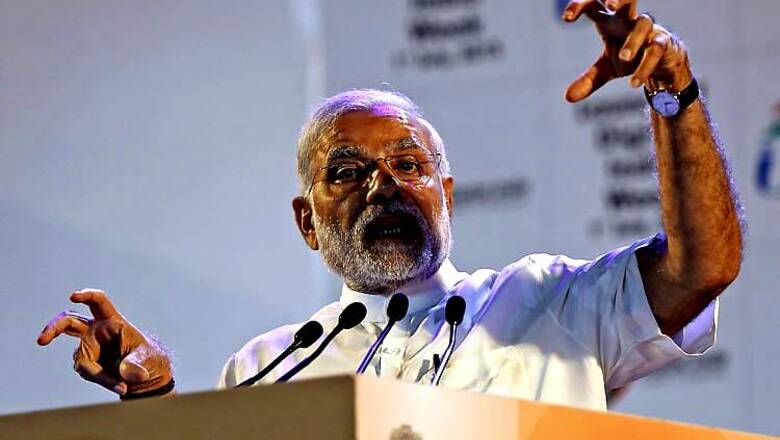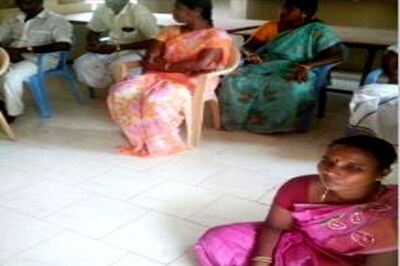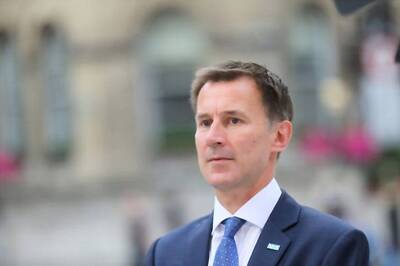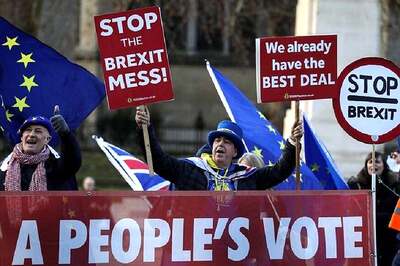
views
UK, US and the European countries dominate the list of 'The Soft Power 30'
But Prime Minister Modi is more popular than President Obama on Facebook in receiving likes, comments, shares and thumbs-up!
Internet is penetrating in India… at a snail's pace. According to internetlivestats.com, 19.19% of India has access to Internet which is 8.33% of total Internet users in the world while it has 17.50% of the world population inhabiting in Bharat. Digitally, India fairs poorly in terms of the usage of the Internet which is also a democratising factor.
Hard Power:
India is a neither a 'hard power' like the US, Russia and China nor the 'soft power' like the UK, Germany and United States among others. It is neither here nor there because its power is nowhere in the world.
Cold War is history (vying for military and ideological dominance by the capitalist USA and the communist USSR-imploded but took shape as semi-democratic Russia and emerged more powerful than its earlier avatar in 21st century). The USA had emerged as the global superpower aided by its poodle the UK and its military alliance the NATO but that recognition was short-lived with the rise of China economically and militarily which also spread its imperialistic tentacles where the US is hated and loathed.
21st century:
The world is not dominated by the US alone, and its bête noire Russia is reclaiming its lost glory though it mutely saw at its threshold the dismemberment of Yugoslavia, and bombing of Serbia in 1990s. In early 2014, the US, Europe and NATO could not stop Russia from annexing the strategic Crimean peninsula on the Black Sea and Sevastopol from Ukraine.
Additionally, no country has the power to challenge China on its track record on human rights, nor to have a people-representative form of government, nor to tell its government to give unhindered access to Internet to its citizens. The world's most representative social media website Facebook with more than a billion subscribers is banned in China. Ironically, China gained immensely by manufacturing and exporting almost everything the world: plastic toys to polythene parachutes to computer devices to soles of shoes. But who can tell China in a globalized and globalizing world (digitally)? Is there a 'hard power' in the world?
Soft Power:
In this scenario, 'hard power' is a country that has a standing in the world in terms of economic might, military strength, permanent membership at the United Nations (USA, UK, France, Russia and China) and aiding countries with financial loans or grants. Yet, no country in the world except for the US has the gumption to take on terrorism or the spread of ISIS (Islamic State of Iraq and Syria) possibly because it was a victim. Clandestinely, Russia and China may woo the anti-US countries, or aid them surreptitiously while competing with the US.
With no institution or agency to rate the top 'hard powers' in the world, or the top 30 countries with hard power (using brute force) an agency in London came out with the list of 'soft power' countries. The London-based consultancy Portland Communications has compiled a list of 30 countries in the world believed to have wielding 'soft power'.
'The Soft Power 30' is topped by United Kingdom and followed by Germany, United States, France, Canada, Australia, Switzerland, Japan, Sweden, Netherlands, Denmark, Italy, Austria, Spain, Finland, New Zealand, Belgium, Norway, Ireland; Korea, Republic (South Korea), Singapore, Portugal, Brazil, Poland, Greece, Israel, Czech Republic, Turkey, Mexico and finally, China.
Anyone with an iota of understanding will come to a conclusion, by glancing at the list of 'The Soft Power 30' as a set-up, or fixed, or biased. One can argue the perspective employed in rating a country as the Soft Power were jaundiced, or done with a blinkered perspective. At least the list will qualify to be termed as Euro-centric view of the world! One may wonder why Greece has failed to make it to the list when its contribution is immense in the fields of language, philosophy, aesthetics, democracy among others if not for relentlessly hitting the headlines for going bankrupt.
Metrics:
Portland Communications informs: "The Soft Power 30 is a ranking of 30 countries around the world, based on a new composite index that measures and compares the resources that determine a country's soft power. It contains 66 metrics across six categories: Government, Culture, Education, Global Engagement, Enterprise and Digital."
What about BRICS? Out of Brazil, Russia, India, China and South Africa only two countries made it to "The Soft Power 30": Brazil at 24th position and China at 30th place.
Who was behind sourcing the metrics for rating the countries' 'soft power' status? Facebook! Portland Communications, the strategic communications consultancy specialising in government communications and global campaigns, informs: "Facebook provided aggregated and anonymised data to help Portland develop a set of digital diplomacy metrics for inclusion in the Digital component of the index. ComRes designed and commissioned new international polling on crucial reputational touch-points for countries." What is the sample size? How representative it is? Though many questions remain to be answered, and analysed the findings of the consultancy made a news item (box item) here and there but blissfully ignored by most of the Indian media.
In compiling it, 'The Soft Power 30' - the ability to persuade another country - was headed by none other than the political scientist Professor Joseph Nye who developed the concept of soft power, and also coined it in 1990. He is the author of Soft Power: The Means to Success in World Politics.
Powerless India:
Why India fails to figure in the list in spite of being a democratic country [world's largest democracy in action however functional and dysfunctional (Monsoon Session 2015)], contributing to culture (at the global level - International Yoga Day, anything else? Gandhi as the symbol of non-violence, anything else?), and growing digitally (India is the third largest country in the world after China and the USA in terms of the number of Internet users). India fails appallingly in education, global engagement, enterprise (not owning and running motels and corner-shops) and in governance (what is there for the world to learn from India in those fields?).
However, it is time to realise how India performs appallingly in terms of wielding 'soft power' in the world, if not as a 'hard power'. The solace for India is that Prime Minister Narendra Modi is more popular on Facebook than US President Barack Obama. But will it help India really becoming a digitally-connection country?
The reality is India is neither a 'hard power' nor a 'soft power' at time when a country's strength is also rated by taking 'digital' as a metric.
(Kovuuri G Reddy is the author of 'Handbook of Journalism and Media: India, Bharat and Hindustan'. He specializes on Internet & Indian Media)




















Comments
0 comment